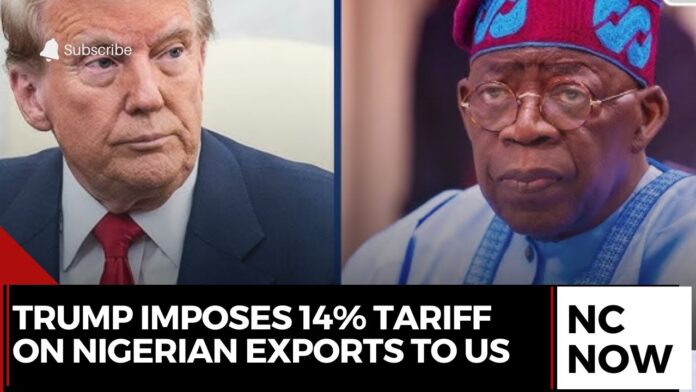‘For instance, processed agricultural goods such as cocoa derivatives, sesame seeds, and ginger, which have gained modest penetration in U.S. markets, are likely to witness a drop in export volume.’
Siaka MOMOH
The Manufacturing Association of Nigeria (MAN), has stated, in clear terms, that Trumps 14% tariff imposition on Nigerian exports undermines the competitiveness of such exports in the US.
It argues “MAN members who are exporters in Agro-processing, chemicals and pharmaceutical, basic metal, iron & steel, non-metallic mineral products and other light industrial manufacturing rely heavily on the U.S. for market access. With increased costs for American buyers due to the tariffs, demand for Nigerian products is expected to decline.
“For instance, processed agricultural goods such as cocoa derivatives, sesame seeds, and ginger, which have gained modest penetration in U.S. markets, are likely to witness a drop in export volume. According to the National Bureau of Statistics, agricultural exports accounted for over N4.42 trillion in 2024, with the U.S. being one of the top destinations. The tariff could potentially wipe out N1 to N2 trillion of that figure annually.”
MAN says, “In addition to revenue losses, the new tariffs pose a significant disincentive to firms investing in value-added manufacturing. Over the past decade, manufacturers have made concerted and strategic efforts to support the country’s transition from exporting raw commodities to semi-processed and finished goods. However, higher market-entry costs because of higher tariff on Nigerian products reduce the profitability of such investments, making it more attractive for firms to revert to exporting raw materials.”
For MAN, ”This is counterproductive to Nigeria’s industrialization agenda and compromises the long-term goal of achieving export diversification under platforms such as the African Continental Free Trade Agreement (AfCFTA).”
It argues: “Moreover, the implications on employment in the manufacturing sector are dire. As export revenues fall, many companies may reduce their production scale or downsize their workforce to cut costs. Contract manufacturers, small-scale industrialists, and firms operating in special economic zones targeting the U.S. market are likely to be worst hit. This could lead to job losses at a time when the national unemployment rate remains high, and youth underemployment continues to pose a socio-economic threat. Additionally, Nigerian firms that are part of regional or global supply chains—particularly in pharmaceuticals, chemicals, foods and beverages and motor vehicle assembly—stand to lose their competitive edge, as their products become less attractive to U.S. companies seeking sourcing partners.”
MAN also draws attention to the impact of the tariff imposition on the brother economy. According to the Manufacturers Association, “Beyond the manufacturing sector, the Nigerian economy is not insulated from the effects of the U.S. tariff decision. First, there is direct impact on Nigeria’s trade balance. With the country already grappling with a fragile external sector, any significant reduction in exports to the U.S. will erode the current trade surplus, potentially pushing the balance into deficit. This will have immediate implications for the nation’s balance of payments and could result in a drawdown of foreign reserves, putting further pressure on the exchange rate. The Central Bank of Nigeria may be forced to intervene more aggressively in the forex market, thereby reducing its buffer for managing other macroeconomic shocks.”
For MAN, “The timing of the tariff decision is particularly difficult for the federal government, which has tied much of its 2025 budgetary projections to optimistic revenue assumptions. The budget, pegged at N55 trillion, assumes oil prices will average $75 per barrel throughout the fiscal year. However, the reality of the global oil market is starkly different, with current prices already falling below $60 per barrel. If export earnings from non-oil sectors such as manufacturing also decline due to the new U.S. tariffs, the government will face greater shortfall in revenue. This could lead to cuts in capital expenditures, delays in infrastructure projects, and an increase in borrowing—all of which could undermine economic growth and stability.”
MAN says there is also the inflationary dimension to consider. “As the trade environment becomes more uncertain and foreign exchange earnings dwindle, monetary authorities may be compelled to raise interest rates in a bid to control inflation and stabilize the naira.
“However, higher interest rates will increase the cost of borrowing for businesses, including manufacturers, and could stifle domestic investment. The ripple effects will be felt by consumers, as firms pass on higher costs through increased prices for goods and services. This will exacerbate the cost-of-living crisis and further strain household incomes.”
MAN argues, “Moreover, the tariff hike will halt investors’ confidence in the economy. Nigeria has been striving to position itself as a manufacturing hub in West Africa, partly by attracting foreign direct investment from firms interested in tapping into both domestic and export markets. The new tariff regime makes Nigeria a less attractive proposition for such investors, particularly those who view access to the U.S. market as a key strategic advantage. In 2023 alone, Nigeria’s manufacturing sector attracted over $1.6 billion in capital importations. That figure could decline significantly in 2025 if investor confidence is not restored through robust policy responses.”
Available data show that the United States remains one of Nigeria’s most significant trade partners, accounting for approximately 7 percent of its non-oil exports. In 2024, bilateral trade between Nigeria and the US stood at N9.59 trillion, representing 6.9 percent of Nigeria’s total trade volume. Of this, Nigerian exports to the U.S. amounted to N5.52 trillion, while imports from the U.S. stood at N4.07 trillion.
Worried MAN argues that the new tariff regime directly threatens this trade dynamic, particularly in a year when Nigeria is projecting an ambitious N55 trillion budget and facing the downward trend in global crude oil prices, which have already fallen below the government’s benchmark of $75 per barrel.
For MAN, the tariff hike, therefore, comes at a vulnerable moment when the country is just recovering from the impact of the government policy mix that has had negative effects on the manufacturing sector.



